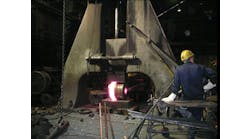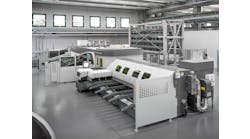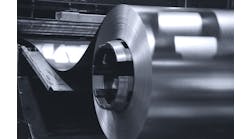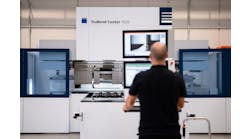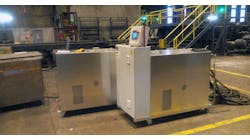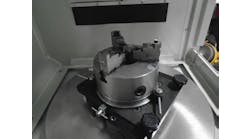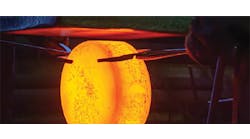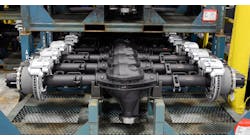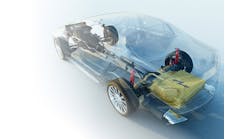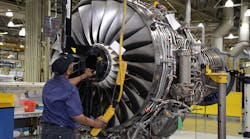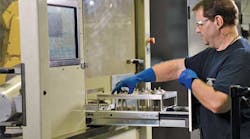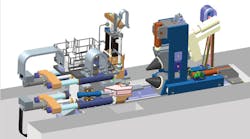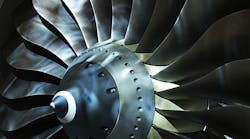Jet engine builder Pratt & Whitney plans to install a new isothermal forging operation as one part of an extensive capital investment program at its manufacturing complex in Columbus, GA. The total investment will be approximately $386 million, all of which is intended to expand and improve production of turbofan engines for commercial and military aircraft.
The Pratt & Whitney complex, about 90 miles south of Atlanta, includes the Columbus Engine Center, which performs maintenance on PW1100G-JM, V2500, PW2000, F117, and F100 turbofan jet engines; and Columbus Forge, which produces compressor airfoils and nickel and titanium forgings. Those parts are finish-machined for installation as rotating parts for military and commercial engines.
P&W estimated the entire investment would result in 500 new full-time positions at the Columbus complex. Its announcement also included news of an expanded relationship with Columbus Technical College, to provide four- to nine-week programs focused on aerospace mechanics and advanced manufacturing technologies, for new and existing employees.
Currently, Columbus Forge produces disks, seals, rings, hub, and blade forgings for the full range of Pratt & Whitney engines, including PurePower® Geared Turbofan™ (GTF) engines for commercial aircraft and the F135 engine installed in the F-35 Lightning II Joint Strike Fighter jet.
The forging operation, established in 1984 to produce turbine disks and airfoils for the F100 engine program, is Pratt & Whitney’s domestic source for isothermal forgings. In 2014, P&W acquired Precision Components Intl. and consolidated that business with Columbus Forge.
Now, every P&W engine relies on aircraft engine blades and vanes forged at the Georgia plant. It also produces parts installed in industrial gas turbines.
In addition to isothermal forging, Columbus Forge completes post-processing activity on forged parts. It developed a “dual-property heat-treating” process that imparts unique metallurgical properties required for the emerging class of jet engines; as well as a “heat-treat air-impingement quench process” to improve cooling uniformity for better process control and to optimize forgings’ mechanical properties.
Pratt & Whitney also emphasizes the product R&D capabilities of Columbus Forge, specifically its metallurgical developments involving powder metallurgy.
The new investment in isothermal forging calls for a 20,000-sq.ft. plant to be built, with related infrastructure. Pratt & Whitney did not detail the cost of this effort, nor indicate any of its equipment selections, though the isothermal forging process involves an integrated system for heating dies and workpieces and forming parts under a gas atmosphere or vacuum.
In isothermal forging, the dies and the workpieces are heated to the same temperature so that the forming process can take place without loss of temperature. An important benefit of the process is that the operating force needed to shape parts remains comparatively low, which is necessary when forming critical alloys with fine-grain structures.
One emerging class of products from isothermal forging is titanium-aluminide (TiAl) parts. TiAl alloys are intermetallic chemical compounds that are high in density, lightweight, and heat-resistant. While the material’s ductility has been a problem for product designers, TiAl’s intermetallic structure is the basis for its high strength and excellent creep resistance at high temperatures. That, as well as the material’s lightness (the density is 4 grams per cubic meter) makes it well suited for aircraft engine components. The material provides the potential to reduce the weight of turbine blades for aircraft engines by up to 50%. Its strength-to-weight characteristics also provide a significant reduction of centrifugal forces within the aircraft engine.
Pratt & Whitney develops and produces commercial jet engines, notably the PurePower GTF series selected by Airbus for its A320neo, Bombardier for its C Series, Embraer for the E-Jet E2 series, and Mitsubishi Aircraft Corp. for the Mitsubishi Regional Jet, and United Aircraft Corp. for its Irkut MC-21 aircraft. The PurePower GTF (Geared Turbofan) engines are designed with a gear system separating the engine fan from the low-pressure compressor and turbine, so that each module operates at optimal speed. The PurePower GTF series are a critical product line for P&W, and for commercial airline operators, because they offer “double-digit improvements in fuel consumption, noise, environmental emissions and operating costs.”
A larger portion of the overall investment will be directed at expanding maintenance services and reducing production costs for current and future engine programs. In addition to the forging operation, a new, 200,000-sq.ft. plant will be built to house GTF engine overhaul operations.
The Columbus Engine Center was established in 1996 to overhaul Pratt & Whitney JT8D engines, then transitioned to V2500 engine overhaul in 2002, having serviced more than 1,000 such engines to date. In 2011, it added overhaul capabilities for the F117 and PW2000 overhaul capability, following that in 2014 with F100 overhaul capability. Last year, P&W started a $65-million program to add maintenance capability for the PurePower GTF engines, which offer double-digit improvements in fuel consumption, noise, environmental emissions and operating costs.
“We’re investing heavily in our Columbus facility to support the increased production and services planned for our F135 and GTF engines,” according to Chris Calio, president, Pratt & Whitney Commercial Engines. “This investment will help ensure that we have the appropriate infrastructure, tooling, and trained workforce in place to provide the best products and services to our customers worldwide.”

